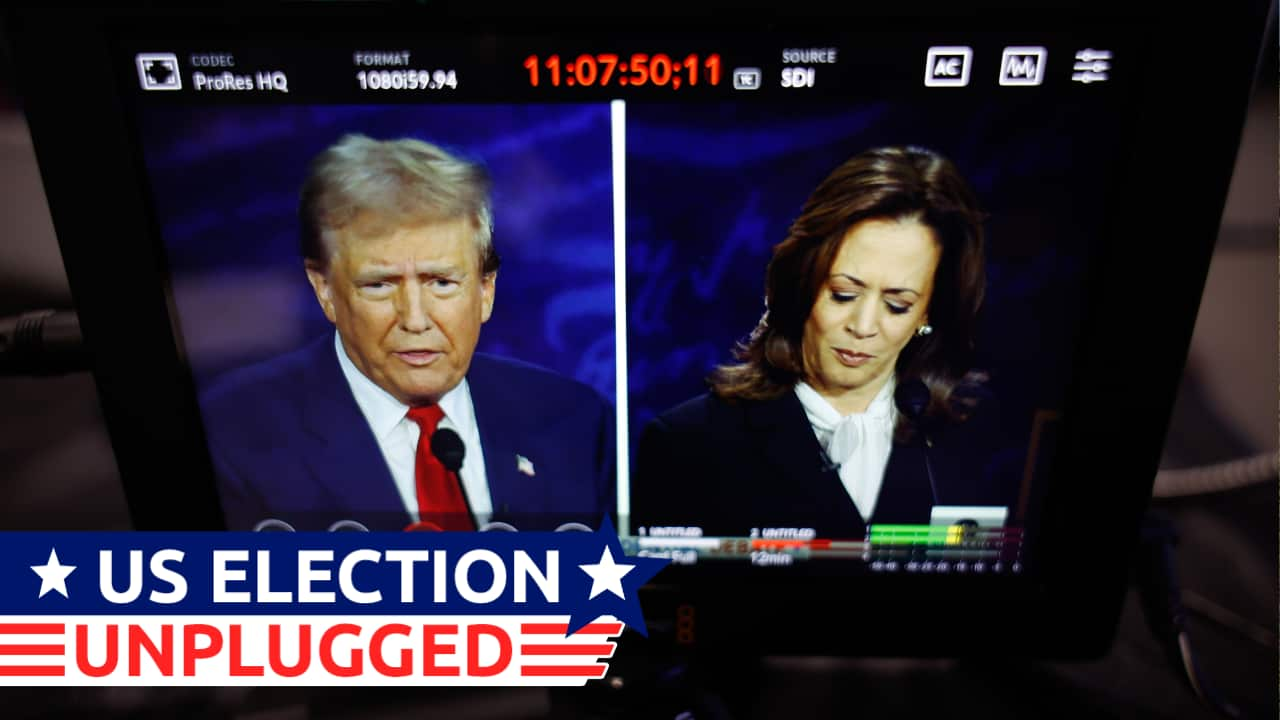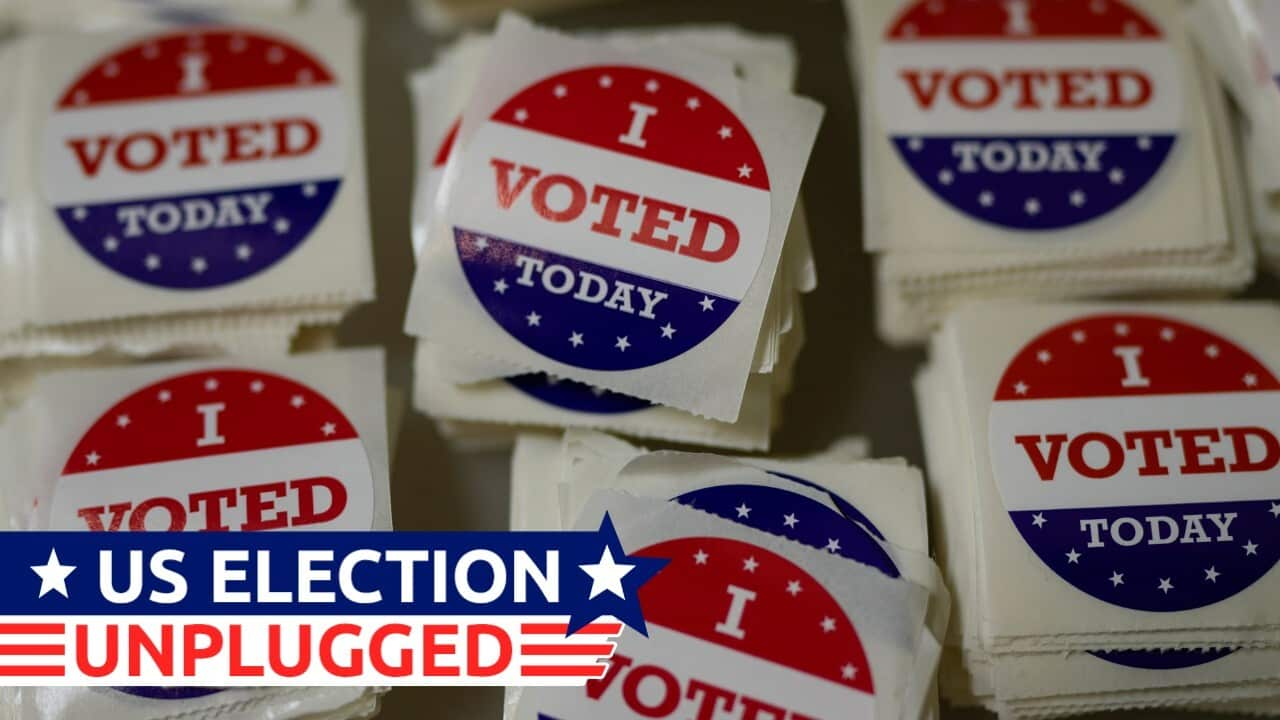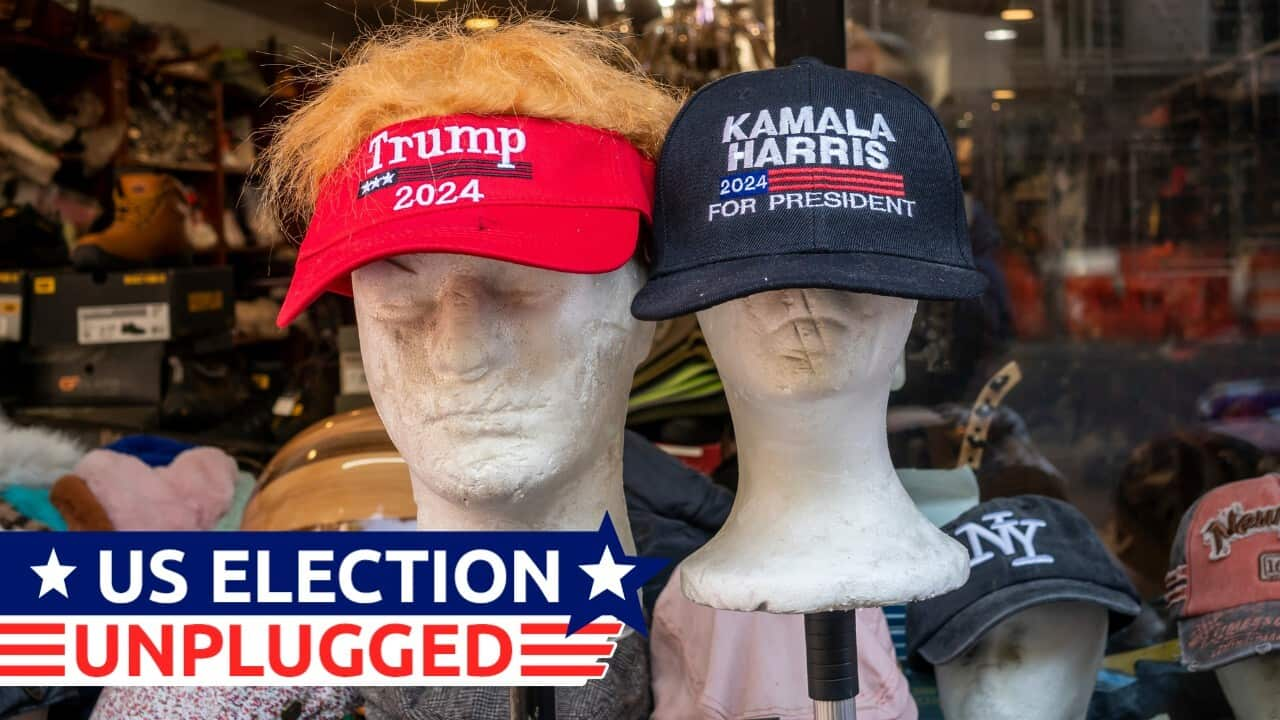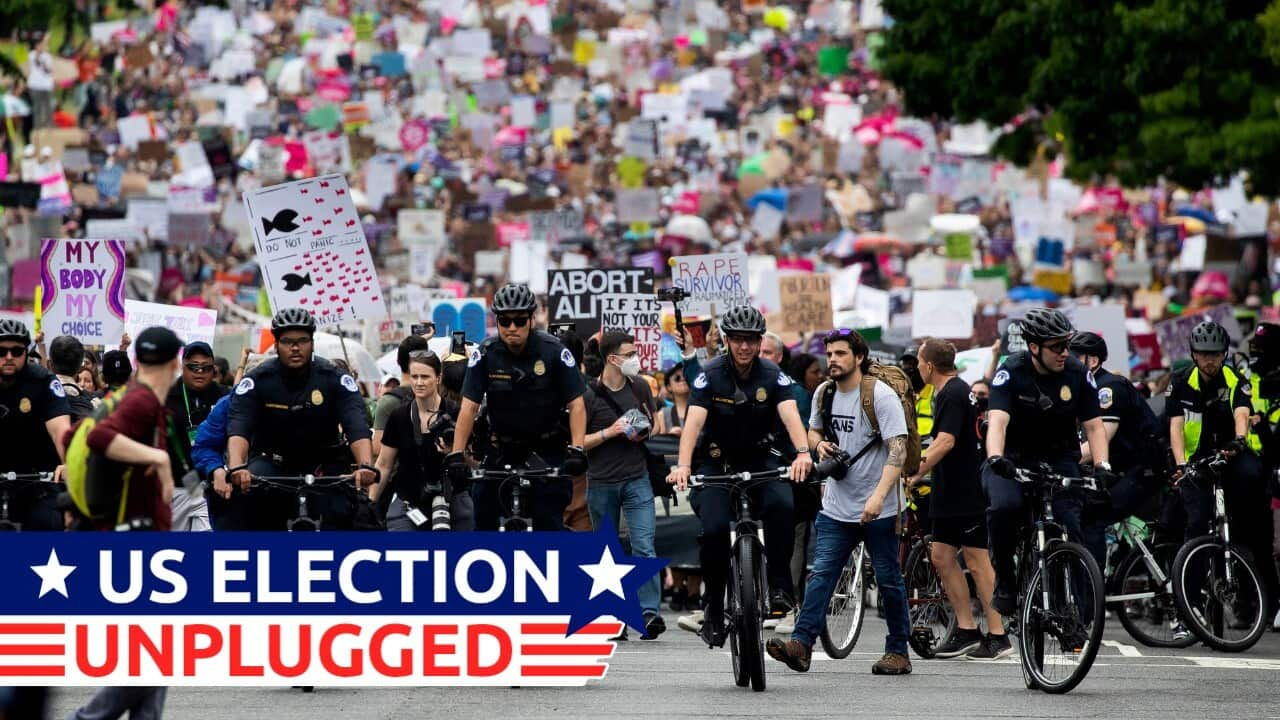TRANSCRIPT
There has long been a sense among voters - like for Peg Timpone, in Cobb County, Georgia - that this November's election is important.
"I think this is probably the most important voting season of our lifetime. I think it is imperative that every single person vote to help save democracy."
Little wonder then that the final presidential debate in September was anticipated by millions.
"Tonight, the high stakes showdown here in Philadelphia between Vice President Kamala Harris and former President Donald Trump. Their first face to face meeting in this presidential election; their first face to face meeting ever."
The debate was a chance for the candidates to talk about their policies - but Chapman University political scientist Lori Cox Han says many undecided voters were left disappointed by a lack of specifics on that score.
"A lot of them are saying, well I'd still like to hear more detail, especially from Kamala Harris. But Trump's not exactly talking about details of his plans either."
That kind of reaction wasn't necessarily reflected in the post debate coverage.
It was instead mostly about who won, like this report from the BBC.
"Kamala Harris didn't answer everything. She didn't really have a satisfactory explanation for why she's changed her mind on different policies over the years. But Donald Trump was just too rattled, too discombobulated, to be able to capitalise on her weaknesses."
While most pundits also gave the victory to Kamala Harris, Donald Trump felt differently, later calling for the ABC network's broadcast credentials to be pulled over the presidential debate.
He made a similar call after the vice-presidential debate aired on CBS.
"So CBS gets a license and the license is based on honesty. I think they have to take their license away."
Neither of these statements garnered much media attention - but this remark did:
"A lot of towns don't want to talk about it because they're so embarrassed. In Springfield, they're eating the dogs. The people that came in. They're eating the cats. They're eating the pets of the people that live there."
It's these types of questions - about how much we focus on policies versus the personalities and what they do and say - that are central to covering the entire campaign.
If part of our job is to present voters with information so they can make up their minds about candidates, how do we show who these people are - and what they stand for?
There's stories that involve the straight recounting of events, like Kamala Harris accepting the Democrats' nomination for president after Joe Biden decided to withdraw from the White House race.
"On behalf of everyone whose story could only be written in the greatest nation on Earth, I accept your nomination to be president of the United States of America.”
And then there are stories about issues, policies - and the actions of the candidates themselves.
Andrea Carson is a former journalist and now professor of political communication at La Trobe University in Melbourne.
She says it's the outrageous candidates that tend to garner the lion's share of attention.
"Newsrooms for a very long time have been driven by deadline pressures and time pressures and seniority and sources, and part of that logic of what makes the news is following around politicians. And when they say something that is considered newsworthy - and Donald Trump has years and years and years of practice in understanding what gets attention."
Professor Carson says social media has also challenged the traditional job of the media in covering candidates.
"One of the things that makes this role more complicated is that not everyone is getting the same information all of the time because it has fragmented across the different digital and analogue media spheres. And so people are getting their information - some of it is high quality and some of it is low quality, depending what aspects - whereabouts they are getting their information from."
Campaign coverage has also become especially challenging with the emergence of candidates like Donald Trump.
His critics say he's media savvy - but not fit for office.
"Donald Trump is increasingly unstable and unhinged. And he is out for unchecked power. That's what he's looking for. He wants to send the military after American citizens."
Many have also noted a tendency towards what they've described as inflammatory rhetoric, on issues like immigrants in Aurora, a suburb of Colorado:
"They're breaking down doors, they're collecting the rent. Is it nice, they just come over from Venezuela. They are collecting the rent, you think - and you know what the landlord said? Whatever you'd like, sir."
Trump has also made statements like this on abortion:
"If the radical democrat extremes get their way, they will have a federal law for abortion to rip the baby out of the womb in the seventh, eighth, and ninth month and even execute the baby after birth."
There's also the matter of Trump's coherence.
Key figures like former president Barack Obama says Trump is renowned for not making much sense any time he speaks.
"You've got the the tweets in all caps, the ranting and raving about crazy conspiracy theories. The two hour speeches. Word salad."
Conventional wisdom once dictated that the press should limit coverage of the outrageous statements Trump traditionally makes, and avoid an outright emphasis on these kinds of arguments, for the sake of being objective and fair.
Some experts now think the best way to cover him is to give people a greater opportunity to hear what he says.
But even then, that's easier said than done.
Journalist Parker Molloy has told CNN reporters are widely toning down Trump's speeches.
She calls it 'sanewashing'.
"Sanewashing is another term for what I like to call coherence bias, or essentially the tendency of journalists to find sense in rambling, sometime incoherent messages. In the case of Donald Trump, this might take the form of him giving a speech in which he talks about electrocuting sharks, Hannibal Lecter, his hatred of windmills - and then seeing it framed as an economic address in the next day's newspaper."
After the first presidential debate, Joe Biden's rambling delivery garnered widespread attention.
"We begin tonight with the race for the White House in the wake of that first Presidential debate. President Joe Biden's poor performance, halting and stumbling at times."
But Parker Molloy says Donald Trump doesn't get that same kind of focus.
"You know, day in and day out journalists are exposed to this, and so as a result sometimes he's graded on a curve that doesn't exist for other politicians. If say, Kamala Harris came out and gave a 10-minute speech about windmills, people would be very confused and it would be news. But when Donald Trump does it, it's kind of just, 'well that's Donald Trump."
The New Yorker contributor has told CNN journalists shouldn't be doing that - arguing it's a form of misinformation to be avoided.
"Most people don't have time to sit down and watch a Trump speech live. They rely on journalists to do this for them and to inform them of what's been said. If dangerous and unhinged claims are being made but are little more than a footnote in a story that frames Trump's speech as a normal one that focuses on say, immigration policy, most people aren't going to truly get the essence of what was said."
For some observers, highlighting Trump's personality, as well as his criminal past and administrative record, should be a sign to voters to avoid casting their ballots for him.
19 year old waitress from Pasadena in Maryland, Mackenzie Anthony, has taken heed of that message.
"Trump has done a lot of things that are just not OK in general... I don't think we should be in a country where men are allowed to commit felonies and then be a president."
But for this Arizona voter Kesha Lyell, it makes no difference.
"(We are) here for President Trump today. We've been here for an hour. We went to the Glendale rally. He is the man. We want him back. We want our country back. Go Trump."
For a candidate like Kamala Harris, the approach to coverage has been somewhat different.
There was an early focus on her popularity with younger voters, and the memes that had popped up on social media after this Vice-Presidential comment:
" My mother used to... She would give us a hard time sometimes and she would say to us, 'I don't know what's wrong with you young people. You think you just fell out of a coconut tree?' (Laughs)."
Some of the attention has been on her record in office - both as vice-president and the attorney general of California.
Harris has just embarked on a media tour to put some of that speculation to rest, including an interview with Chalamagne tha God.
CHARLAMAGNE: "One of the biggest allegations against you is that you targeted and locked up thousands of black men in San Francisco for weed. Some say you did it to boost your career. Some say you did it out of pure hate for black men. Please tell us the facts. What's the facts of that situation?”
HARRIS: "It's just simply not true. And what public defenders who were around those days will tell you, I was the most progressive prosecutor in California on marijuana cases and would not send people to jail for simple possession of weed."
The question of whether or not voters are prepared to elect a woman to the highest office in the land - for the first time - has been raised mainly at Democrat rallies, with Hillary Clinton at the party's convention urging voters to support Harris, eight years after her own historic nomination.
"On the other side of that glass ceiling is Kamala Harris raising her hand and taking the oath of office as our 47th president of the United States."
In the news media, attention has been more on the nature of Harris' campaign, which is heavily focussed on the states where the result is not a foregone conclusion - known as swing or battleground states.
Stories have noted the ten stops she's made so far in Pennsylvania - and the press tour she's just embarked on in the last weeks before election day.
Still, Andrea Carson says gender does influence media coverage - and voter behaviour.
"Absolutely it does. We know that women get treated quite badly in politics... Both male and female politicians attract abuse, but for women it's linked to their gender. Not so much for men."
Racial issues have also made their presence felt.
Harris has garnered media attention in the last few weeks over reports that black male voters, traditionally a bedrock voting base for the left, are wavering.
There's been stories on PBS and Mother Jones, picked up on by other outlets - even though some voters - like 75 year old retired teacher Windsor Wade, from Geneva in New York - are highly sceptical.
"I think that this whole concentration of her slipping among black voters is a red herring. It's one of these things that people need to poke holes at her. And I think too this thing about black men being attracted to Trump is nonsense. It's poppycock."
Race has not been so much a feature of Trump-centred stories.
There's been some that note his attempts to woo the so-called manosphere - made up of the white male voters which are a traditional core constituency for the Republicans and Donald himself.
They record that he's appealed directly to them - especially the evangelical base - to support him.
"Christians, get out and vote, just this time... You won't have to do it anymore. Four more years. You know what, it'll be fixed; it'll be fine. You won't have to vote anymore, my beautiful Christians."
This statement caused some alarm - sparking discussion about Trump's motives for a second term.
Less attention has been paid to just how loyal this demographic is.
It's perhaps often portrayed as a fairly homogenous block - but some studies have suggested there's a gap that is widening on both economic and cultural issues, between white voters with a college degree and those without - and those who consider themselves evangelical, or Christian voters.
Some say exit polls in both 2016 and 2020 showed that Trump won white working-class evangelicals but lost other white working-class voters that other Republicans had no trouble getting.
Andrea Carson says it's often difficult to communicate these kinds of policy and political nuances in media campaign coverage.
"Talking about the nuanced details of public policy can feel boring in comparison. And so journalism and reporting is attracted to where there is conflict, tension, where something exciting is happening... and that's only been amplified with the rise of short form video platforms like TikTok. Politicians understand this. They want to get the coverage so that they're front of mind with voters. And so they use these visual elements they know are very conducive to media reporting."
Some voters - like North Carolina resident Andrew Best - say there's so much information coming from different sources, they have trouble telling fact from fiction.
“It's hard to take everything that you hear on the news these days with a grain of salt and what's true, what's not, and who says what. It's kind of hard to take everything in and kind of choose what you wanted to believe by yourself what is true.”
Let Professor Carson have the last word on why it's still important for media to show us who the candidates are.
"As citizens, healthy democracies enable mass participation and they enable rational choice with voting for our desired elected representative. And the media plays a role in both helping people to participate, and also having informed choices when it comes to polling day."













